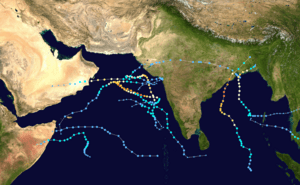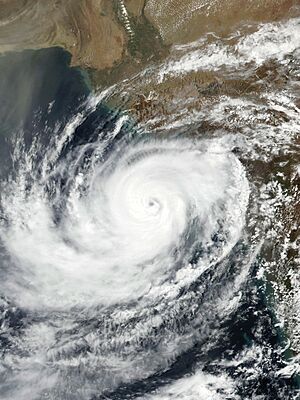2019 North Indian Ocean cyclone season facts for kids
The 2019 North Indian Ocean cyclone season was a time when many strong storms, called tropical cyclones, formed in the northern Indian Ocean. These storms are also known as hurricanes or typhoons in other parts of the world. Even though there's no official start or end date for this season, most of these powerful storms usually happen between April and December. The busiest times are often in May and November.
The first named storm of 2019 was called Pabuk. It entered the Indian Ocean on January 4th. This made Pabuk the earliest storm to form in this region that we know of! During this season, there were several different types of storms, including depressions, deep depressions, cyclonic storms, and very severe cyclonic storms.
How the Season Unfolded

The year 2019 saw some interesting weather patterns. One of these was a weak El Niño effect. This can change weather around the world. It might have played a part in the early arrival of Pabuk on January 4th. This storm was the earliest cyclonic storm ever recorded in the North Indian Ocean, matching a record from 2014.
The second big storm of the season was Fani, which formed on April 26th. Fani grew very strong, becoming an "extremely severe cyclonic storm" by April 30th. It was as powerful as a Category 4 hurricane on the Saffir-Simpson Scale. When Fani hit India and Bangladesh, it caused a lot of damage, costing about $1.8 billion. Sadly, it also led to the loss of many lives.
In early June, another storm called Vayu formed. This happened in the Arabian Sea, near the Maldives. Vayu quickly became a "very severe cyclonic storm" by June 12th. It moved towards northwestern India and Pakistan, bringing strong winds and heavy rain.
Related pages
See also
 In Spanish: Temporada de ciclones en el Índico Norte de 2019 para niños
In Spanish: Temporada de ciclones en el Índico Norte de 2019 para niños
 | Aaron Henry |
 | T. R. M. Howard |
 | Jesse Jackson |



